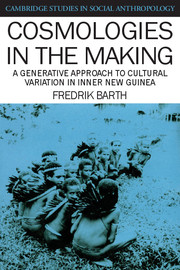Book contents
- Frontmatter
- Contents
- Foreword by Jack Goody
- Map: Major territories of the mountain Ok
- 1 The problem
- 2 An attempt at systematic comparison: descent and ideas of conception
- 3 The possible interrelations of sub-traditions: reading sequence from distribution
- 4 The context for events of change
- 5 The results of process – variations in connotation
- 6 Secret thoughts and shared understandings
- 7 The stepwise articulation of a vision
- 8 Experience and concept formation
- 9 The insights pursued by Ok thinkers
- 10 General and comparative perspectives
- 11 Some reflections on theory and method
- Bibliography
- Index
- Cambridge Studies in Social Anthropology
8 - Experience and concept formation
Published online by Cambridge University Press: 05 June 2012
- Frontmatter
- Contents
- Foreword by Jack Goody
- Map: Major territories of the mountain Ok
- 1 The problem
- 2 An attempt at systematic comparison: descent and ideas of conception
- 3 The possible interrelations of sub-traditions: reading sequence from distribution
- 4 The context for events of change
- 5 The results of process – variations in connotation
- 6 Secret thoughts and shared understandings
- 7 The stepwise articulation of a vision
- 8 Experience and concept formation
- 9 The insights pursued by Ok thinkers
- 10 General and comparative perspectives
- 11 Some reflections on theory and method
- Bibliography
- Index
- Cambridge Studies in Social Anthropology
Summary
The thesis I am pursuing is not intended to oppose a Durkheimian perspective with the simplistic observation that cultural form and practice are ultimately the work of individuals. Quite clearly, Mountain Ok cosmology is produced and reproduced by collective social processes. But an adequate model of any social process requires an account of individual activity as well as group activity. Moreover, such a model should identify causal links, and not mere correlations or isomorphies, between forms of ritual and forms of society. In preceding chapters I have shown that particular features of the social organization of the Ok cosmological tradition of knowledge are such as to stimulate and canalize individual creativity and performance in ways which profoundly affect the collective rites and symbols of this traditioa Thus, I claim to have uncovered processes that generate a proliferation and diversity of cosmological schemes. I shall now try to trace some other kinds of causal links between social organization and cult forms. Some features of these cult forms may be regarded as the fruits of particular constellations of organizational features; in other cases the organizational features may best be understood as an effect of certain religious ideas and ritual practices. I shall sketch these connections first with respect to the organization of clans in the Faiwol area, where religious ideas and practices seem to be formative of important features of social organization.
- Type
- Chapter
- Information
- Cosmologies in the MakingA Generative Approach to Cultural Variation in Inner New Guinea, pp. 55 - 64Publisher: Cambridge University PressPrint publication year: 1987

